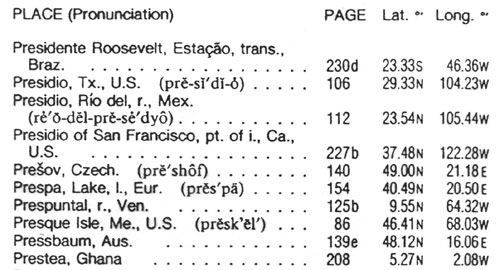|
|
|
|
2. Producing the names index - A) Generics
|
|
|
We need to take the following
into account:
If a name
starts with a separately written
generic (#112) (Mount Everest, Strait of Magellan,
Bay of Fundy), then the name will be alphabetized under the
specific form: Everest, Mount; Magellan, Strait of; Fundy, Bay
of.

So, if a name starts with a ‘loose’ generic element
or an article
(#018), the name will be inverted. Problems:
- The generics/articles must be recognized.
- Take care of "false
generics" (#084) and articles (Rio de Janeiro,
Los Angeles, Cape York).
This means
when generics have become part of a name and no longer serve
in their original capacity, it should be alphabetised as such:
- Rio de Janeiro refers
to a city, not longer to a rivier (=rio), so one finds it
in the index under: Rio de Janeiro.
- But Rio Grande refers to a river, and
it comes in the index under: Grande, Rio
- Cape York Peninsula
(refers to a region, not longer to a specific cape only)
will be indexed under C;
- Los Angeles: when
this originally Spanish name was incorporated into English,
it was no longer realised that Los was a plural of the article.
- But La Paz, the capital of Bolivia, will
be alphabetised under P: Paz, La
- Monte Carlo refers
to a country, and is alphabetised under M, but
- Monte Rosa, a mountain
top in the Italian Alps, will be alphabetised under R
|
  |
|
|
|
|
|
|
|
